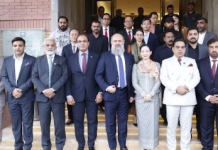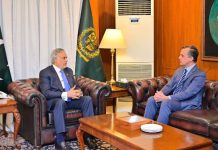By Khalid Bin Majeed
Service to humanity is the biggest faith that towers above all in the world, while those ministering to the suffering humanity in different parts of the world like the silent soldiers of the divine providence far away from their families and the media limelight are the salt of mother earth, who beautify this world with their trailblazing noble deeds and actions.
No matter whichever organization and country they belong to, these silent soldiers, full of human kindness spirits, could be seen helping the people — affected by wars, conflicts, disasters and epidemics –with unquestionable commitment, devotion, dedication, impartiality and neutrality.
There are ways and means to better serve the suffering humanity, which turns them into joyous and the happiest persons on the earth. To that goal, around the world, hundreds ofthousands of female and malehumanitarian workers from all ranks of the society are working to achieve exactly that.
The International Medical Humanitarian Association Médecins Sans Frontières also known as Doctors Without Borders — a worldwide movement of more than 67,000 people working in over 70 countries — is one such organizations that is providing free service to humanity in Pakistan like elsewhere in the world. Founded on 22 December 1971 its qualified health professionals, logistic and administrative staff are guided by medical ethics and the principles of impartiality, independence and neutrality.
MSF enjoys the support of 6.5 million individual donors and private foundations worldwide, reaching over 90% of their funds from private sources. MSF teams all over the world conduct independent evaluations to determine medical needs of the people in affected regions before initiating any project. To respond toglobal emergency situations, MSF keeps pre-packaged kits – from surgical kits to inflatable hospitals to cholera equipment — to ensure a rapid and effective response within hours.
In Pakistan, MSF works in collaboration with the Ministry of Health, providing medical assistance to the people deprived from basic healthcare. MSF is currently working in Khyber Pakhtunkhwa, Balochistan and Sindh. MSF in Balochistan treats patients with cutaneous leishmaniasis, provides mother and child healthcare services, ambulatory therapeutic feeding centre and emergency response to COVID-19 and measles.
The priority for MSF in Pakistan focuses on the continuation of the regular lifesaving activities despite enormous challenges posed by the on-going COVID-19 pandemic. In order to reduce the risk of transmission, the organization adapted its structures and patient passageways and installed screening and isolation areas in the facilities.
One of MSF programme is in Kuchlak,catering to the needs of the local and Afghan refugees. Besides running a mother and child health centre and offering outpatient treatment for women and children, the MSF programme include nutritional support for children under the age of five.
Basic emergency obstetric care is provided through the birthing unit, which is open 24-hours , while referring complicated emergency obstetric cases to Quetta. The other services provided include health education and psychosocial counselling. The Ministry of Health’s Expanded Programme of Immunization is integrated into the services being offered at the Kuchlak health centre.
In 2020, there were 21,618 outpatient consultations, 4,958 assisted births, 3,492 antenatal consultations, and 5,196 individual and group counselling sessions, while 21,563 children were vaccinated against measles and other childhood diseases.
Quetta: MSF provides medical services to patients with cutaneous leishmaniosis [a skin infection caused byphlebotominesandfly] at three treatment centres located in Kuchlak, Benazir Bhutto Hospital in old Marriabad town, and Bolan Medical Complex in Quetta city.
These clinics provide specialized diagnosis and treatment for parasitic skin infection, which is a major public health issue in some parts of the country. MSF is the biggest provider of treatment for this neglected tropical disease in Balochistan. In 2020, 4,988 patients were screened and 3,363 patients started on treatment for the infection.
In Chaman District Headquarter Hospital, MSF supports medical services for women and children, including reproductive, neonatal and paediatrics healthcare. The MSF medical staff offer free, quality medical care to local residents, Afghan refugees and patients.
Since 2007, MSF has been supporting a 24-hour delivery room including surgical management of the complicated deliveries, a pediatric inpatient ward, a newborn unit, and an emergency room for trauma cases.Malnourished children under the age of five are enrolled in a feeding programme (inpatient and ambulatory therapeutic feeding). Through health education sessions, MSF teams sensitize the community on preventing medical condition, seeking timely healthcare, especially during pregnancy.
Blood transfusions, water and sanitation for the health structures, and a basic laboratory are also part of MSF’s services in the hospital. It also supervises the women’s outpatient department, which is managed by the Department of Health staff in close collaboration with the MSF team.
As in other areas, also in Dera Murad Jamali, MSF supports the department of health through its medical activities. MSF teams support inpatient therapeutic feeding for malnourished children with complications, running a general paediatric ward, and a neonatal unit to cater for the needs of the population with limited access to basic healthcare facilities. MSF furthermore provides basic emergency obstetric care through a 24/7 birthing unit, whereas complicated emergency obstetric cases are referred to Larkana, Sindh.
In the eastern districts of Jaffarabad and Naseerabad MSF teams are supporting the nutrition programmes for children under five through mobile clinics, which help combat the increasing malnutrition rates in the region.In 2020 MSF admitted over 8,700 severely malnourished children to the therapeutic feeding programme, and gave antenatal consultations to over 9,500 patients, MSF has assisted over 2,700 births and admitted 936 neonates and children to the facility in Dera Murad Jamali.
Not all heroes wear capes, luckily there are still people who offer their capacities to something bigger than themselves. They will be there when an extreme situation arises, ensures medical assistance when adversity hits, and voluntarily face the challenges to make this world a better place to live.
We must honour the dedication of all these humanitarian workers who continue to do their jobs every day despite the many risks — in the service of our common cause to reach the most vulnerable in our society.

















